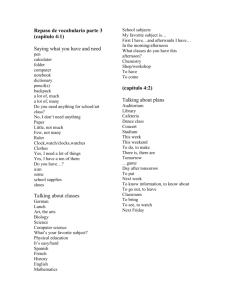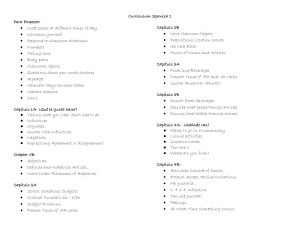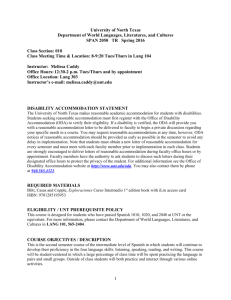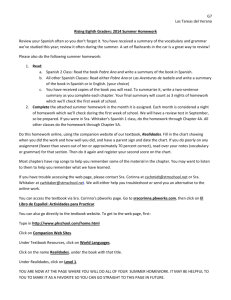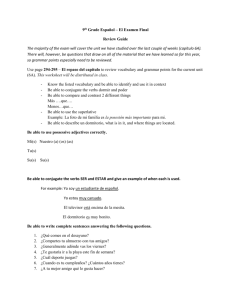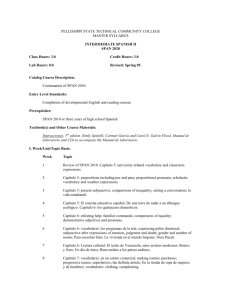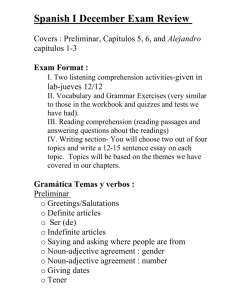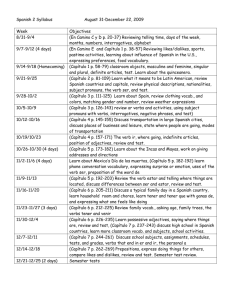Faculty Information System - University of North Texas
advertisement
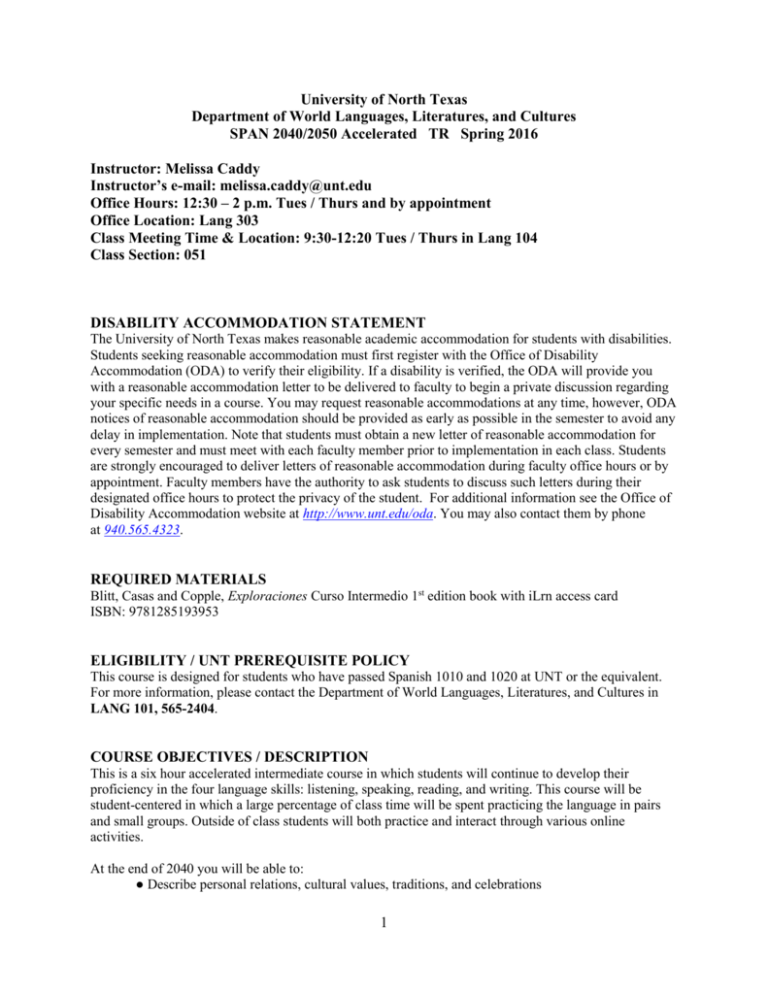
University of North Texas Department of World Languages, Literatures, and Cultures SPAN 2040/2050 Accelerated TR Spring 2016 Instructor: Melissa Caddy Instructor’s e-mail: melissa.caddy@unt.edu Office Hours: 12:30 – 2 p.m. Tues / Thurs and by appointment Office Location: Lang 303 Class Meeting Time & Location: 9:30-12:20 Tues / Thurs in Lang 104 Class Section: 051 DISABILITY ACCOMMODATION STATEMENT The University of North Texas makes reasonable academic accommodation for students with disabilities. Students seeking reasonable accommodation must first register with the Office of Disability Accommodation (ODA) to verify their eligibility. If a disability is verified, the ODA will provide you with a reasonable accommodation letter to be delivered to faculty to begin a private discussion regarding your specific needs in a course. You may request reasonable accommodations at any time, however, ODA notices of reasonable accommodation should be provided as early as possible in the semester to avoid any delay in implementation. Note that students must obtain a new letter of reasonable accommodation for every semester and must meet with each faculty member prior to implementation in each class. Students are strongly encouraged to deliver letters of reasonable accommodation during faculty office hours or by appointment. Faculty members have the authority to ask students to discuss such letters during their designated office hours to protect the privacy of the student. For additional information see the Office of Disability Accommodation website at http://www.unt.edu/oda. You may also contact them by phone at 940.565.4323. REQUIRED MATERIALS Blitt, Casas and Copple, Exploraciones Curso Intermedio 1st edition book with iLrn access card ISBN: 9781285193953 ELIGIBILITY / UNT PREREQUISITE POLICY This course is designed for students who have passed Spanish 1010 and 1020 at UNT or the equivalent. For more information, please contact the Department of World Languages, Literatures, and Cultures in LANG 101, 565-2404. COURSE OBJECTIVES / DESCRIPTION This is a six hour accelerated intermediate course in which students will continue to develop their proficiency in the four language skills: listening, speaking, reading, and writing. This course will be student-centered in which a large percentage of class time will be spent practicing the language in pairs and small groups. Outside of class students will both practice and interact through various online activities. At the end of 2040 you will be able to: ● Describe personal relations, cultural values, traditions, and celebrations 1 ● Talk about foods and eating habits ● Discuss historical figures, politics, and contemporary society ● Report and describe past events ● Express feelings, opinions, preferences, and desires ● Recommend or tell others to do something ● Convey doubt, hope, and uncertainty ● Indicate what you and others have done At the end of 2050 you will be able to: ● Converse about books, music, film, and entertainment ● Discuss work and finances ● Compare and contrast rural and urban life ● Narrate in the past with more accuracy ● Specify future plans and what will have happened by a specific point in time ● Indicate what would happen or would have happened under certain circumstances ● Convey past recommendations, wants, doubts, and emotions ● Express hypothetical situations as well as unplanned events ASSESSMENT FOR SPAN 2040: Evaluation procedure Weight Participation Midterm Exam Final Exam Quizzes: 5 total Online Homework Tasks: 5 total Oral Interview 10% 20% 20% 15% 10% 15% 10% ASSESSMENT FOR SPAN 2050: Evaluation procedure Weight Participation Midterm Exam Final Exam Quizzes: 5 total Online Homework Tasks: 5 total Oral Interview 10% 20% 20% 15% 10% 15% 10% GRADE SCALE: A = 90-100, B = 80-89, C = 70-79, D = 60-69, F = Below 60 2 You will receive two separate grades for this course. If you do not receive a passing grade in the 2040 half of this course, you may not proceed to the second half. PARTICIPATION Class participation is a vital component to the language learning process. Your level of participation and preparation will be evaluated each class, and you will receive an average score twice during each course. This grade will be based on the following: attendance/punctuality, preparation for class, level of engagement, and use of Spanish. The following rubric applies to the class: Level of participation and preparation Arrives on time, stays the full length of class, and meets the following: comes prepared stays on task and is cooperatively and actively involved in all activities attempts to use Spanish as much as possible and willingly volunteers Points 9-10 (A) Arrives on time, stays the full length of class, and meets the following: generally comes prepared generally stays on task and cooperatively participates in activities generally attempts to use Spanish and volunteers 8 (B) Arrives late or leaves early and/or: is not fully prepared is not always on task or participating in activities infrequently attempts to use Spanish 7 (C) Arrives late or leaves early and/or: comes unprepared is frequently off task or not participating in activities makes little effort to use Spanish 6 (D) Arrives late or leaves early and/or: comes unprepared participates little to none in activities makes little to no effort to use Spanish 1-5 (F) Is not present 0 ATTENDANCE POLICY Class attendance is mandatory and essential to your success in learning Spanish. No make-up work will be allowed for unexcused absences. Only those individuals whose absences are authorized by the instructor will be eligible to make up any material missed. Excused absences include the following: illnesses, deaths in the family, religious holidays, and university sponsored activities. For illnesses and deaths, you must provide documentation (physician’s statement, obituary, etc.) the first day you return to class in order to be excused. Absences in observance of religious holidays are authorized only if you have notified your instructor in writing within the first 15 days of the semester. For university sponsored 3 activities, you must obtain authorized absence cards from the Dean of Students and present them to your instructor in order for your absences to be excused. MIDTERM EXAMS There will be a midterm exam for each course. Please note that each exam begins with a listening section. Students that are not present at the time the listening section is administered may not have the opportunity to take it. Make-ups of exams are only allowed in the case of excused absences. FINAL EXAMS The final for 2040 will be Thursday, March 10, during class time. Please see the Registrar’s Exam Schedule at http://registrar.unt.edu/exams/final-exam-schedule for day and time of the 2050 final. Please note that the final exams begin with a listening section. Students arriving late may not have the opportunity to take the listening section. QUIZZES There will be 5 quizzes per course assigned and completed during class time. They may or may not be announced and may cover grammar, vocabulary, culture, reading, etc. Make-ups of quizzes are only allowed in the case of excused absences. ONLINE HOMEWORK You will be assigned a variety of online activities from both the textbook and the SAM (Student Activities Manual). Your online calendar will show the assignments and their due dates. Late submissions of online activities will not be accepted. TASKS Throughout the semester you will be given a variety of task options. You will choose five of these tasks to complete for each course. Many task options will be offered via the Share It! feature of iLrn. Other task options will include movie showings/follow up activities and tertulias. Each task must be completed according to the guidelines set by the instructor. ORAL INTERVIEW Toward the end of each course every student will have a short conversation in Spanish with a classmate covering the communicative functions practiced in class. Orals will be graded on content and detail provided, incorporation of grammatical structures and vocabulary studied throughout the semester, and use of communication strategies. COURSE POLICIES On outside help/academic integrity All assignments should be the student’s work only and should reflect the student’s level of proficiency. Cheating, plagiarism, and other examples of academic misconduct will be pursued and sanctions will be levied. 4 On use of technology during class time While technology will be an important component of this course, class time will be focused on face to face communication and interaction. For this reason, the use of electronic devices will not be allowed during class time unless otherwise indicated by your instructor. On use of e-mail Instructors of first and second year Spanish (1010 through 2050) require students to use official UNT Eagle Connect for all communication. This means that your instructor will only respond to e-mail sent by their students from a UNT Eagle Connect address. Likewise, your instructor will only send e-mail to your UNT Eagle Connect address. Information about Eagle Connect can be found at the following Web address: http://eagleconnect.unt.edu/. On student behavior in the classroom Student behavior that interferes with an instructor’s ability to conduct a class or other students' opportunity to learn is unacceptable and disruptive and will not be tolerated in any instructional forum at UNT. Students engaging in unacceptable behavior will be directed to leave the classroom and the instructor may refer the student to the Center for Student Rights and Responsibilities to consider whether the student's conduct violated the Code of Student Conduct. The university's expectations for student conduct apply to all instructional forums, including university and electronic classroom, labs, discussion groups, field trips, etc. The Code of Student Conduct can be found at www.unt.edu/csrr. A note on protocol: If you have a problem with anything related to your course (textbook, instructor, testing, etc.), it is your responsibility to discuss the problem first with your instructor. Most problems or misunderstandings can be dealt with effectively and efficiently if the people most directly involved can discuss the problem and communicate honestly with each other. Intermediate Coordinator: Ms. M. Estes 5 SPANISH 2040/2050 ACCELERATED DATE January: 19 (T) SPRING 2016 TEXTBOOK: Exploraciones curso intermedio Introduction to the course Capítulo 1: Generaciones y relaciones humanas pp 2-9 21 (R) Capítulo 1: Generaciones y relaciones humanas pp 10-15, 20-21 26 (T) Capítulo 1: Generaciones y relaciones humanas pp 16-19, 22-25 28 (R) Capítulo 1: Generaciones y relaciones humanas pp 27-29 Capítulo 2: Costumbres, tradiciones y valores pp 36-43 February: 2 (T) Capítulo 2: Costumbres, tradiciones y valores pp 44-50, 54-55 4 (R) Capítulo 2: Costumbres, tradiciones y valores pp 51-53, 56-59, 61-63 9 (T) Midterm Exam Capítulo 3: A la mesa pp 72-79 11 (R) Capítulo 3: A la mesa pp 80-85, 90-91 16 (T) Capítulo 3: A la mesa pp 86-89, 92-95, 97-99 TR COURSE CALENDAR iLRN ONLINE HOMEWORK: Weekly iLrn homework due by 11:59 p.m. Friday, Jan. 29 Weekly iLrn homework due by 11:59 p.m. Friday, Feb. 5 Weekly iLrn homework due by 11:59 p.m. Friday, Feb. 12 6 Share it! TASK OPTIONS: 18 (R) Capítulo 4: Héroes y villanos pp 106-119, 124-125 23 (T) Capítulo 4: Héroes y villanos pp 120-123, 126-129 25 (R) Capítulo 4: Héroes y villanos pp 131-133 Capítulo 5: Sociedades en transición pp 140-147 March: 1 (T) Capítulo 5: Sociedades en transición pp 148-159 3 (R) Capítulo 5: Sociedades en transición pp 160-163, 165-167 8 (T) TBA Oral Interviews 10 (R) Review Final Exam 14-18 No Class – Spring Break 22 (T) Capítulo 6: Entretenimiento… ¡de película! pp 174-187, 192-193 24 (R) Capítulo 6: Entretenimiento… ¡de película! pp 188-191, 199-201 29 (T) Capítulo 7: Ganarse la vida pp 210-223, 228-229 31 (R) Capítulo 7: Ganarse la vida pp 224-227, 230-233 April: Capítulo 7: Ganarse la vida Weekly iLrn homework due by 11:59 p.m. Friday, Feb. 19 Weekly iLrn homework due by 11:59 p.m. Friday, Feb. 26 Weekly iLrn homework due by 11:59 p.m. Friday, March 4 Weekly iLrn homework due by 11:59 p.m. Friday, March 11 Weekly iLrn homework due by 11:59 p.m. Friday, March 25 Weekly iLrn homework due by 11:59 p.m. Friday, April 1 7 5 (T) pp 230-233, 235-237 7 (R) Midterm Exam Weekly iLrn homework due by 11:59 p.m. Friday, April 8 Capítulo 8: El campo y la ciudad pp 244-251 12 (T) Capítulo 8: El campo y la ciudad pp 252-257, 262-263 14 (R) Capítulo 8: El campo y la ciudad pp 264-267, 269-271 19 (T) Capítulo 9: Sigue el ritmo pp 278-289 21 (R) Capítulo 9: Sigue el ritmo pp 290-301 26 (T) Capítulo 9: Sigue el ritmo pp 303-305 Capítulo 10: El mundo literario pp 314-321 28 (R) Capítulo 10: El mundo literario pp 322-333 May: 3 (T) Capítulo 10: El mundo literario pp 334-337, 339-341 5 (R) TBA Oral Interviews 7-12 Final Exams Weekly iLrn homework due by 11:59 p.m. Friday, April 15 Weekly iLrn homework due by 11:59 p.m. Friday, April 22 Weekly iLrn homework due by 11:59 p.m. Friday, April 29 Weekly iLrn homework due by 11:59 p.m. Friday, May 6 8 9
